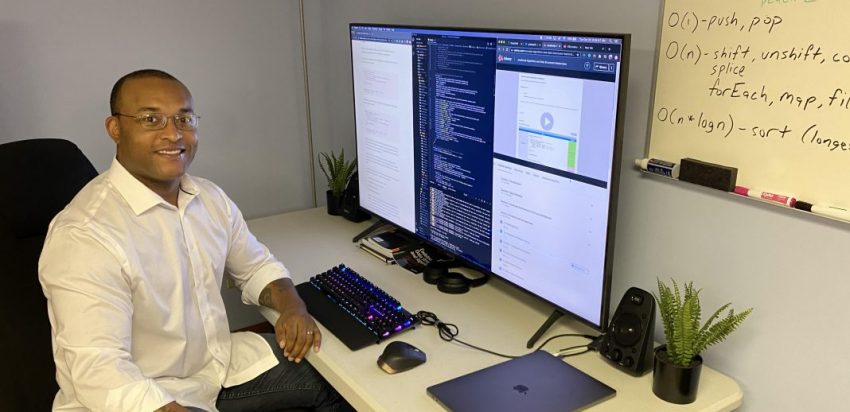“Jump on Board or Get Left Behind”: This Marine Corps Veteran Made Coding His Mission

After serving two tours of duty in the Marine Corps, Chris Helm found himself wondering: What’s next? Which tangible skills can I learn to bring value to the planet, my family, and myself? What do I want to do until retirement?
Luckily, he didn’t have to wait long for an answer. Chris had always been fascinated by computers—and decided it was finally time to set his curiosity in action. “I saw the CWRU Coding Boot Camp and signed up immediately, going into the tech industry cold turkey,” he said. “I didn’t know about HTML or CSS. I knew nothing about computers, just that you type and check emails on them. I had to learn how to learn.”
Today, Chris is a software engineer at the tech company AtomRain and the happiest he’s ever been. Read on to discover how this decorated military veteran made programming his mission—and why he now encourages others to do the same.
What’s one of the biggest challenges you overcame in the boot camp?
I’m a war veteran, two-time wrestling champion, and recipient of the Navy Achievement Medal. There can be a lot of pride and ego behind that personality—and programming humbled me to the point of infancy. You have to accept the fact that it doesn’t matter what you’ve accomplished in life. You have to realize: I don’t know what I don’t know.
How did your time in the military make you a better student?
In the military, you’re trained to accomplish a mission. You can’t quit. When I enrolled in the coding boot camp, not graduating wasn’t an option. I knew I was 100 percent making the right decision for my future—I had to bring value to myself so I could bring value to others.
How did you land your current software engineering job at AtomRain?
My honesty landed me the position. During the interview, I didn’t act like I knew things I didn’t. I was honest about what I understood—and wasn’t afraid to admit what I didn’t. They appreciated my authenticity, and I was offered a position with the company that same day. It wasn’t because I was the best programmer. It was because I was honest about my experience and they felt I was coachable.
What has this new career meant for your family?
The tech industry can change your life financially. I don’t know of another industry where you can put your head down for two to five years, then look up and be making the same amount of money as a heart surgeon who spent 12 years in school. And you come out with no debt. Everything is hard: physical labor, writing, coding. Nothing rewarding is easy. I chose my hand—and I’m the happiest I’ve been in my life.
How did the boot camp change your life?
I always ask myself: What’s the alternative? Once you dive deep into that question, you see the writing on the wall. Line up 100 people in 100 industries. Tech will wipe out more than half of those industries. When I’m tired, when it’s hard, during moments of mental weakness, I ask myself: What’s the alternative?
Am I meant to be a realtor? They probably won’t exist in 20 years—it’ll be done by artificial intelligence. A loan officer? In the next ten years, buying a home online will be as easy as ordering a pizza. Humanity has always gone through major shifts. Everyone used to get around by horse and buggy—but eventually, we transitioned to cars. Before currency, there was barter and trade. Then currency. Then debit and credit cards. Then the internet. Then the touch screen. Then apps. Then Venmo, Google Pay, and cash apps. The next transition will be cryptocurrency. Whether you like it or not, change is happening all around you. Tech is taking us to places we couldn’t imagine. You can either jump on board or get left behind.
What advice would you give people considering a career change?
Look at the writing on the wall. Recognize how important technology is. Don’t be comfortable falling back into your everyday life. You have to understand that 75 percent of the jobs that will exist in the next ten years don’t exist right now. Millions of jobs will be lost because of tech, but tech will also create millions of jobs. Do not ignore the writing on the wall and think you’re safe in your current job for the next 10 to 20 years. You could be a part of the population that loses their job due to tech, or you can pursue tech. Our destiny is in our own hands.

 Live Chat
Live Chat